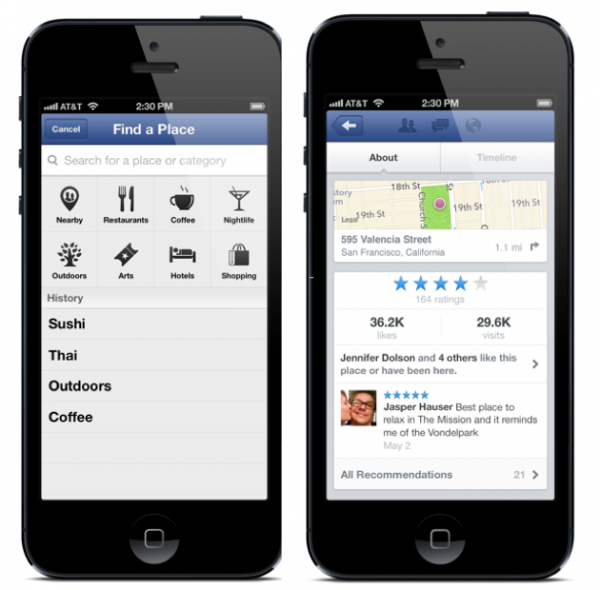Facebook Gets Into Local Search With “Facebook Nearby” For iOS & Android
As of today, you can count Facebook as a potentially significant new competitor in local search — on mobile devices. The company is updating the “Nearby” feature in its iOS and Android apps Nearby Becomes Local Search Tool Previously Nearby was about finding where your friends had checked-in. After the app update Nearby will still […]

Nearby Becomes Local Search Tool
Previously Nearby was about finding where your friends had checked-in. After the app update Nearby will still show you where your friends have checked-in. But now, more importantly, it will also show you nearby businesses and other places ranked by various criteria. It becomes a local search and discovery tool.
You’ll be able to search or browse in the new UI to find local businesses by name or by category. This change is designed to make the Facebook app a go-to source for local information (at least in selected categories).
Results will be ranked according to a number of criteria: star ratings, check-ins, Likes and recommendations. Your network will act as a filter. But where there is no feedback from your network the larger Facebook community’s engagement with that business or place will determine the ordering of the results presented to you.
Ratings will be on a five-point scale (image above). Only people who’ve checked-in to a business (legitimately) may rate it. Facebook said that you may rate a business any time after a check-in. It won’t be limited to the time you’re physically present in the location.
If You Don’t Have a Page, You Won’t Show Up
Facebook is only relying on its own data and only showing places where there are associated Pages (with locations) in its database. Businesses that don’t already have a presence on Facebook will need to set one up to be found. Accordingly Facebook will see Pages penetration grow especially among small businesses that don’t already have Pages.
Here’s Facebook’s “SEO” advice to make Pages more discoverable in the new Nearby feature (from its blog post):
- Update your Page to include all of your basic information, including your address, store hours, phone number, and details about your business in the About section
- Update your category to make sure you appear when people are looking for your specific type of business
- Encourage your consumers to like, check into, rate, and recommend your place
Facebook Nearby thus becomes a new front in the expanding battle over local business reputations. Local SEO practitioners will now have to focus on helping their clients get ratings/reviews on Google, Yelp and Facebook, among any others.
I haven’t used the new Nearby yet. I’ve only talked to Facebook and seen these screens. I can’t attest to how “good” Nearby is or how easy it is to use. One question, however, is how prominent Facebook will make the new Nearby?
Right now you access Nearby through the left-hand apps sidebar menu. That qualifies as “buried” for most Facebook mobile users.
However “Check In” is one of three tabs above the newsfeed. That Check-in tab will likely lead into the new Nearby experience and/or could be transitioned over time. If that’s the case then Facebook could see considerable usage of the new feature.
Give the company’s massive mobile user base everyone should take this move seriously from a marketing and competitive standpoint. At last count Facebook said it had 600 million monthly active mobile users.
Local Data Coverage and Ads
The Nearby database won’t be as comprehensive as Google’s or Yelp’s. However Facebook will have the potential advantage of business owners providing all the data themselves (or through trusted surrogates). Thus it probably won’t suffer the kinds of inaccuracy or staleness problems that plague some of the other local search data and platforms in the market.
As you might expect, Facebook told me there will be no ads. The company didn’t suggest by implication there would be any ads in the future. But the opportunity is too obvious for the company to ignore. You can expect that at some point within the next year or so (my speculation) there will probably be an advertising opportunity in local results.
My guess is that if Facebook delivers on the promise of Nearby the most vulnerable direct competitor will be Foursquare, which will be forced to further innovate and add bells and whistles to differentiate from Facebook’s new capability. The “behavioral” dimension of Facebook’s reputation/ratings scheme reminded most of what Foursquare is doing with local search.
Only on Mobile — for Now
Facebook Nearby local search will only be available on Facebook’s mobile apps. The company didn’t indicate to me whether the feature would also be coming to the desktop. However if all goes well I suspect that it will.
I would also guess that this is a first significant step in a more comprehensive search strategy that could make Facebook a much more utilitarian destination and true rival to more familiar search engines.
No doubt you’ll see plenty of sensational “X-killer” headlines today about how Facebook is gunning for this or that company. The truth is that the Nearby update is a natural and logical evolution of Facebook’s mobile app and its capabilities. Its logic is driven by Facebook’s internal needs and evolution in mobile.
Facebook wants to better serve its users, wants to engage more deeply with SMBs and get more Pages created. It wants to further monetize mobile and it believes it can offer “word of mouth at scale.” All of these things at least conceptually come together in the new Nearby functionality.
Opinions expressed in this article are those of the guest author and not necessarily Search Engine Land. Staff authors are listed here.
Related stories
New on Search Engine Land

